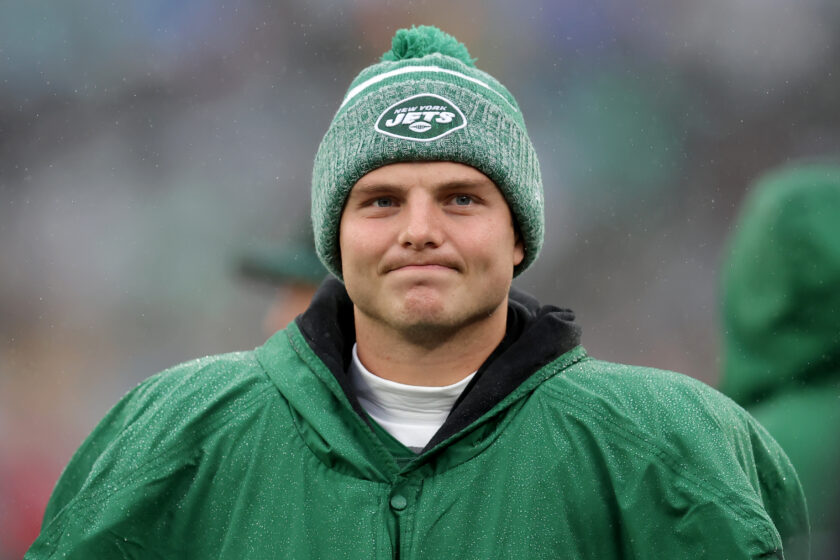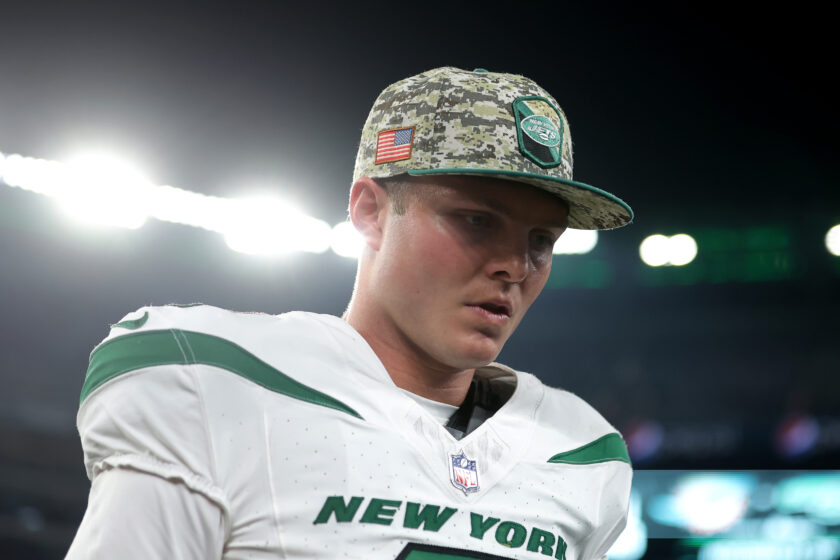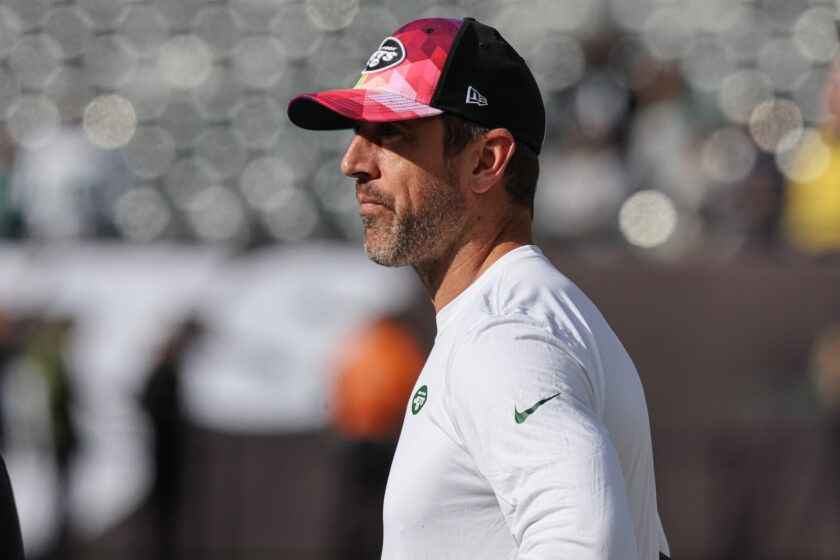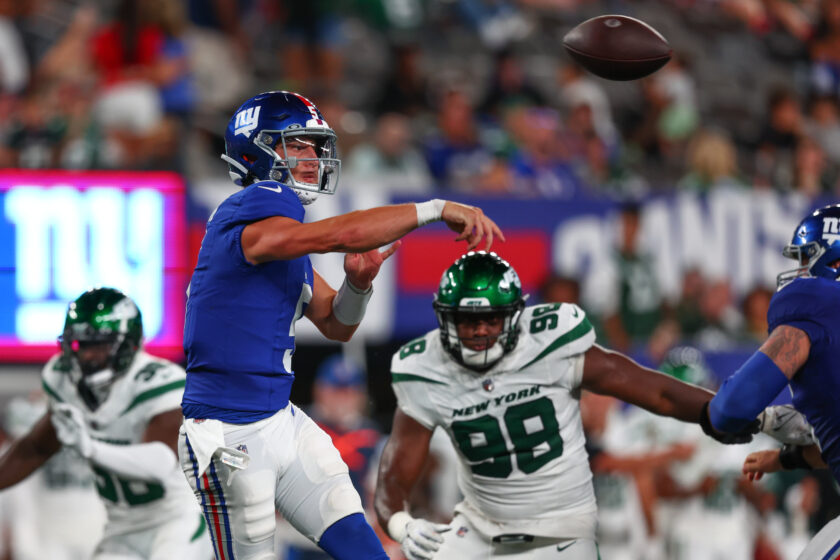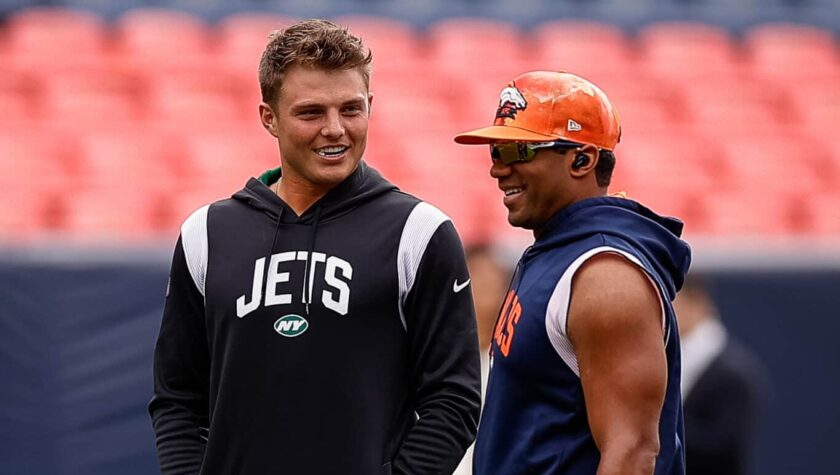Key numbers from New York Jets’ loss to the Philadelphia Eagles
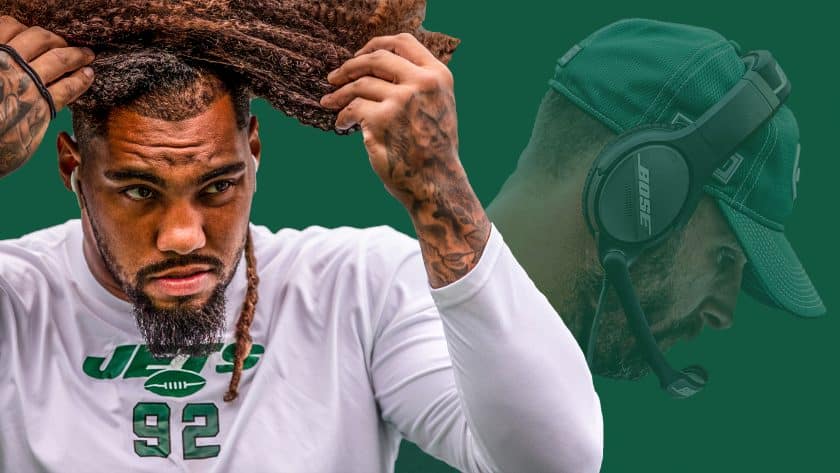
Key numbers and statistics from the New York Jets’ Week 5 loss to the Philadelphia Eagles to drop to 0-4 on the season.
Look no further, the New York Jets have officially begun the 2019 regular season with four consecutive losses. The latest was a painful one, too. Gang Green suffered a 31-6 defeat at the hands of the Philadelphia Eagles.
Let’s break down that loss and look at some of the numbers from that matchup.
[sc name=”Jets Title” text=”1.69 – net yards-per-pass attempt by Jets offense in Philadelphia” ]The Luke Falk-led Jets continue to rewrite the history books with their all-time levels of awfulness.
Against the Eagles, Falk completed 15 of 26 passes for 120 yards, zero touchdowns, and two interceptions, earning a ghastly 37.3 passer rating and an even worse 1.8 QBR (ESPN). The former Washington State star also took nine sacks for 52 yards.
Falk became the first Jets quarterback since Brooks Bollinger in 2005 to have back-to-back games with under 100 yards of passing on at least 20 pass attempts.
In total, the Jets offense could only muster up 69 passing yards on 36 passing plays. This resulted in a net yards-per-pass attempt average of 1.69. That is the second-worst single-game mark posted by a Jets team over the past 40 years, better than only the team’s 2017 loss in Denver. It’s also the 15th-worst NY/A mark in Jets history – 13 of the top 15 worst occurred in the 1970s.
Additionally, the Jets’ NY/A average of 1.69 against the Eagles currently stands as the worst mark posted by a team in 2019.
The disaster in Philly continued to push the Jets further down the ladder of all-time ineptitude. Through four games, the Jets have totaled just 718 yards. That’s the second-worst mark through four games in Jets history, trailing only the 1971 team. It’s the 12th-worst mark since the 1970 merger, and the second-worst mark in the 21st century (2001 Redskins).
On a per-play basis, the Jets are even worse. They’ve averaged 3.19 yards-per-play this season. That’s the seventh-worst mark since the merger and the worst since the 1978 Buccaneers.
How about this — the Ravens are averaging more rushing yards per game this season (192.2) than the Jets are averaging total yards per game (179.5).
Sam Darnold and Chris Herndon cannot get back soon enough. Hopefully, the talented young duo can provide a spark that’ll erase these dreadful records from the memories of Jets fans.
[sc name=”Jets Title” text=”10 – sacks allowed by the Jets offense” ]The Jets took way too many sacks in Philadelphia — 10, to be exact. That was the second-most sacks ever allowed in one game by the Jets, tied with a 1985 road loss to the Raiders. The team record is 11, with a tie between a 1987 loss to the Cowboys and a 2012 loss to the Chargers.
It’s nearly impossible to be successful when the quarterback is dropped that many times. Jets history makes that obvious. The loss to Philly was the 23rd game in franchise history in which the Jets allowed seven sacks or more. Their record in those games: 1-22. They scored an average of 13.5 points in those contests.
New York’s insanely terrible sack tally against the Eagles was largely on the quarterback himself.
Luke Falk’s pocket presence was awful. On a few sacks, the protection was actually solid, but Falk held the football far too long. That was a theme throughout the game. Falk moved through his reads at a sluggish pace, taking eons to make a decision with the ball. Much of the time, the defense made the decision for him, either taking the football away or putting Falk on the ground before he tried to do anything at all.
There were instances where receivers were open. But, Falk either didn’t see them or was simply too gun-shy to take the shot. The young quarterback was much too conservative in this game, seeming afraid to toss the ball beyond the marker. That came back to bite him, as his hastiness often led to him taking a crushing hit.
[sc name=”Jets Center”]The offensive line is not off the hook. Everybody struggled in pass protection in this game.
Two changes were made up front, as Alex Lewis slid in for the injured Kelechi Osemele at left guard and Chuma Edoga took over at right tackle for the benched Brandon Shell.
There were flashes of improvement, as at times the line held up impressively well against heavy blitzes. But the issues were still there all too frequently. Brian Winters, in particular, had a brutal game, losing a ton of 1-on-1 battles. Kelvin Beachum and Lewis had some miscommunications handling stunts (a recurring issue for Beachum over the last few years). Ryan Kalil allowed more free rushers to get by him. Edoga had a rocky starting debut.
Darnold can do a lot to fix this offense. However, he’s not going to bring a new offensive line on to the field with him. He’ll need to find a way to succeed in spite of the group protecting him — just like he did quite a few times in his rookie season.
[sc name=”Jets Title” text=”4 – penalties by Trumaine Johnson and Leonard Williams” ]Two of the biggest investments for the Jets have been two of the worst players on the field in 2019.
Trumaine Johnson and Leonard Williams continued their embarrassing starts to the season against the Eagles. They committed two penalties apiece while struggling in their respective roles.
For some reason, Johnson started against the Eagles after being benched in back-to-back games. Nate Hairston was mysteriously relegated to the bench.
After the game, it was revealed that Adam Gase said he liked Johnson’s performance in practice and made the decision to play him.
Given the fact that Hairston had been substantially better than Johnson through three weeks, that decision by Gase was foolish enough in a vacuum. On game day, it was proven to be just as bad a choice as one would expect it to be. The Eagles toasted Johnson numerous times. Johnson looked like the only player on the Jets defense getting consistently beat in coverage.
Earning the fourth-most guaranteed money at the cornerback position while performing at a practice squad level, Johnson’s contract is arguably the worst value in the NFL.
Williams’ performance in Philadelphia continued what has been a highly disappointing season. For the second consecutive game, he posted zero quarterback hits or tackles-for-loss while committing at least one penalty (he had two against the Eagles). It’s the first time in his career he’s had back-to-back games of that variety — he only had one such game over his first 66 career outings.
In a contract year, Williams has no sacks, no tackles-for-loss, and is on pace for a career-low in quarterback hits and a career-high in penalties.
Safe to say, that’s not a great recipe for a large new contract.
[sc name=”Jets Link Next” link=”https://elitesportsny.com/2019/10/07/new-york-jets-lb-neville-hewitt-bright-spot-during-dim-time/” text=”New York Jets LB Neville Hewitt: A Bright Spot During A Dim Time” ]Jets/NFL at ESNY ----- Twitter: @Michael_Nania ----- Cool Your Jets Podcast with Ben Blessington

